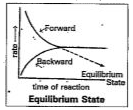What are equilibrium processes? Explain equilibrium in Physical and Chemical processes with examples.Solution in Telugu
Equilibrium State (or) Equilibrium Process : The state at which the velocity of forward reaction becomes equal to the velocity of backward reaction or reverse seaction is called .equilibrium state.. Consider a reversible reaction.
A+B⇔C+D taking place in a closed vessel. At the beginning we have only the reactants A and B. Their concentrations are maximum. As the reaction proceeds the reactants A and B change into the products C and D. The Equilibrium concentrations of the products increase gradually.
The rate of forward reaction diminishes while the reverse reaction sets in and proceeds with increasing speed. A state is soon reached where the speeds of forward and backward. reactions become equal. If the rate of forward reaction Vf = The rate of reverse reaction (Vb).
The system is said to have attained a state of equilibrium. Once equilibrium is reached there is no further change in the composition of the system. The system appears to be stand still although it is. dynamic. The products are formed by forward reaction just as fast as they change back into reactants by the reverse reaction.
The state at which the rate of forward reaction is equal to the rate of the reverse reaction in a reversible reaction is known as the equilibrium state or chemical equilibrium.
Examples:
(i) Equilibrium physical processes :
(a) Equilibrium between two phases (i.e.), physical transformation processes.
solid ⇔ Liquid (melting or fusion)
(b) Equilibrium between two different allotropic forms of same substance
α- Sulphur ⇔β− Sulphur
(ii) Equilibrium chemical processes :
(a)N2(g)+3H2(g)⇔2NH3(g)
(b) 2SO2(g)+O2(g)⇔2SO3(g)
(c) H2(g)+I2(g)⇔2HI(g)

Topper's Solved these Questions
- CHEMICAL EQUILIBRIUM AND ACIDS BASES BOOK - VIKRAM PUBLICATION ( ANDHRA PUBLICATION)CHAPTER - CHEMICAL EQUILIBRIUM AND ACIDS BASES EXERCISE - SHORT ANSWER QUESTIONS
70 Videos
- ATOMIC STRUCTUREBOOK - VIKRAM PUBLICATION ( ANDHRA PUBLICATION)CHAPTER - ATOMIC STRUCTUREEXERCISE - LONG ANSWER QUESTIONS
15 Videos
- CLASSIFICATION OF ELEMENTS AND PERIODICITY IN PROPERTIESBOOK - VIKRAM PUBLICATION ( ANDHRA PUBLICATION)CHAPTER - CLASSIFICATION OF ELEMENTS AND PERIODICITY IN PROPERTIESEXERCISE - Long Answer Questions
24 Videos
Similar Questions
Write expression for the equilibrium constant, Kc, for each of the following reactions:
(i) 2NOCl(g)↔2NO(g)+Cl2(g)
(ii) 2Cu(NO3)2(s)⇔2CuO(s)+4NO2(g)+O2(g)
(iii) CH3COOC2H5(ag)+H2O(I)⇔CH3COOH(aq)+C2H5OH(aq)
(iv) Fe+3(aq)+3OH−(aq)⇔Fe(OH)3(S)+
View SolutionExplain Rutherford 's nuclear of an atom . What are its drawbacks ?
View SolutionDiscuss in detail about the classification of elements by Mendeleeff.
View Solutionभौतिक प्रक्रमों में साम्यवस्था के सामान्य अभिलक्षण बताइए ।
View SolutionWhat are equilibrium processes? Explain equilibrium in Physical and Chemical processes with examples.
View SolutionGive the general characteristics of equilibrium involving physical processes.
View Solutionरासायनिक साम्य क्या है ? साम्य को प्रभावित करने वाले कारकों को समझाइए ।
View SolutionWhat are equilibrium processes? Illustrate this equilibrium in physical and chemical processes.
View SolutionWhich of the following is a characteristic of equilibrium with a physical process?
View SolutionWhat are the types of chemical equilibrium? Explain with suitable example.
View SolutionAre physical and chemical weathering processes independent of each other? If not, why? Explain with examples.
View SolutionExplain thermal and mechanical equilibrium processes.
View SolutionExplain thermal and mechanical equilibrium processes.
View SolutionExplain thermal and mechanical equilibrium processes.
View SolutionExplain types of physical equilibrium by giving example.
View SolutionChemical equilibrium, explain by example of 'chemical reaction'.
View Solution
